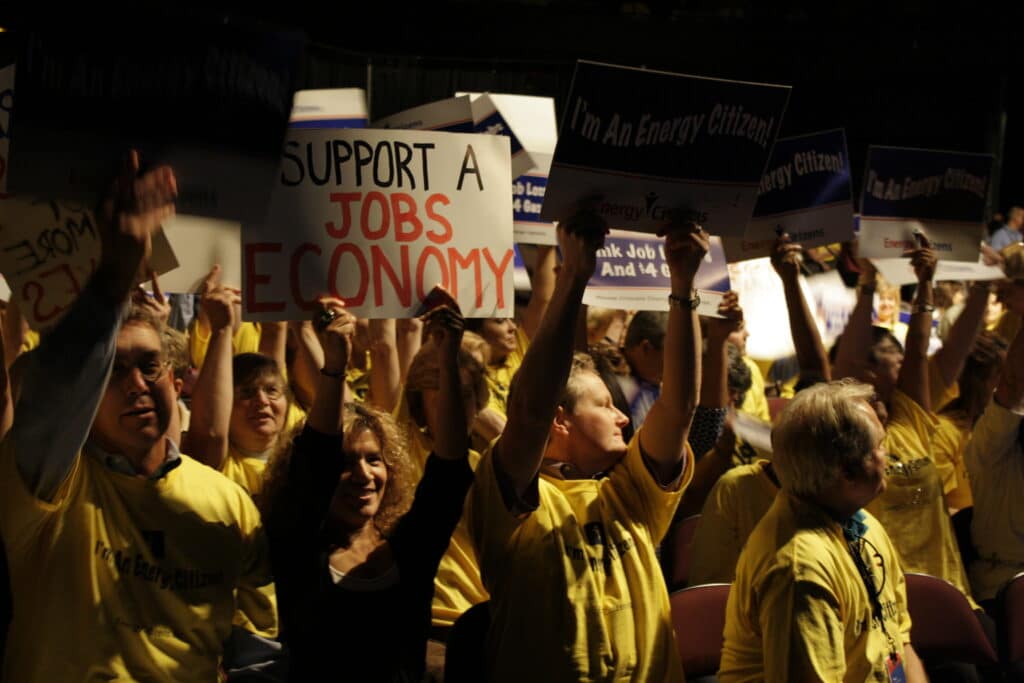On Wednesday, a group of more than 450 scientists called on advertising agencies to cut off their fossil fuel clients and to end their ties with an ongoing misinformation campaign that has time and again killed progress on addressing the climate crisis.
In a joint letter, the scientists say that they are “consistently faced with a major and needless challenge” of having to correct false information and rebut the fossil fuel industry’s efforts to downplay the severity of climate change. The expensive and glossy ad campaigns “represent one of the biggest barriers to the government action science shows is necessary to mitigate the ongoing climate emergency,” the letter stated.
The letter was sent to advertising companies WPP, Edelman, and IPG, as well as some of their clients, including Unilever, Amazon and Microsoft, which all have announced various climate and sustainability pledges.
“The science could not be more clear: We must eliminate carbon pollution as soon as possible — nearly 50% this decade, and fully by 2050. That requires an immediate and rapid transition away from all fossil fuels,” the scientists wrote. “To put it simply, advertising and public relations campaigns for fossil fuels must stop.”
Coordinated with Clean Creatives, a climate campaign meant to pressure the advertising industry, and the nonprofit Union of Concerned Scientists, the letter was organized and signed by a group of leading scientists including Jason Box, Astrid Caldas, Peter Gleick, Ayana Elizabeth Johnson, Michael Mann, Kate Marvel, and Katharine Wilkinson.
These people are intimately familiar with the rapidly destabilizing climate and its effects on the planet, and have been contributing to the scientific understanding that underscores the necessity of rapidly shifting away from fossil fuels. They study glaciers and global temperature changes, climate solutions and adaptation, the oceans and the human influence on global warming. And as this letter makes clear, they have had enough.
“I’m glad to see scientists and activists pressuring firms like Edelman, as this elevates a critical issue across the PR and ad industry,” Christine Arena, a former VP at Edelman, who has sought to expose the greenwashing done by the PR industry on behalf of its fossil fuel clients, said in a statement to DeSmog, commenting on the impact of the scientists’ letter.
I understand agency employees wanting to protect their anonymity to preserve business relationships, but this moment calls for courage. Just like COVID disinformation, climate disinfo costs lives.
— Christine Arena (@ChristineArena) January 20, 2022
If you don’t speak out now, then when?#LeakForPlanet
But, she added, it is not just a matter of who PR firms represent, but how they do it. “While some agencies have come forward with new climate statements and principles, none have acknowledged the peer-reviewed research regarding their role. None have admitted to any wrongdoing or answered the question: What are they doing to contain climate disinformation and greenwash today?” Arena said.
Front Groups, False Solutions, and Promotional PR
The fossil fuel industry’s spin has long eschewed outright climate science denial and instead shifted to a multi-pronged strategy to delay a reckoning on climate change – and PR firms have played an instrumental role in this effort.
As researchers at Brown University’s Climate and Development Lab have noted, the advertising industry has helped fossil fuel companies distort climate science, promote false or misleading solutions, create astroturf campaigns to distract and confuse the public, and attack environmental groups. As hired mercenaries, PR firms often cite their environmental clients in an attempt to absolve themselves of complicity in derailing climate action.
But public relations firms have a long history of working for fossil fuel interests; in fact, some of the first and most influential PR professionals launched their careers and their industry with oil and coal clients in the early 20th century. And even in more recent years, PR firms have helped create front groups and astroturf organizations on behalf of Big Oil.
One notable example was Edelman’s creation of Energy Citizens, an astroturf organization purporting to be a “nationwide alliance of organizations and individuals formed to bring together people across America to remind Congress that energy is the backbone of our nation’s economy and our way of life.”
Paid for by the American Petroleum Institute (API) — the nation’s largest oil and gas lobby group — Edelman helped organize 20 rallies in 2009 supposedly led by Energy Citizens to pressure Congress to oppose landmark cap-and-trade legislation that was under consideration. The rallies were intended to create the appearance of grassroots opposition, but in some cases the attendees were oil company employees brought in during their lunch breaks.

Three years later, API turned to PR firm DDC, which used the Energy Citizens brand to recruit people to testify in favor of fracking at U.S. Environmental Protection Agency hearings. DDC also arranged meetings between Energy Citizens and members of Congress to further bolster support for fracking.
In addition, DDC ran a sister outfit called Energy Nation, which was supposedly “made up of hundreds of thousands of Americans, who are determined to see our nation develop balanced energy policies that support American jobs, economic growth and national security.” Another effort at misleading the public into thinking it was a grassroots effort, the API-funded Energy Nation campaigned against taxes on the natural gas industry, which was flourishing under the fracking boom.
Edelman and DDC did not respond to questions from DeSmog.
With the climate crisis worsening and the impacts increasingly apparent, much of the work by PR firms in recent years has focused on promoting false solutions to climate change’s causes and positioning the fossil fuel industry as a good-faith partner in building a cleaner future.
One prominent example is ExxonMobil’s promotion of biofuels over the past decade, with its algae-based biofuels program playing an outsized role in its advertising.
In 2019 New York PR firm BBDO helped ExxonMobil spread this message in its “Miniature Science” ad campaign. Set against upbeat music, a narrator explains the virtues of algae-based biofuels, with miniature petri dishes and containers of algae liquids. “Algae might just be the future of biofuels,” the ad says. Another ad features miniature power plants to promote “cleaner electricity” from natural gas, whose methane emissions are a major driver of rising global temperatures.
As Brown University researchers note, BBDO said the campaign was aimed at Gen Z, a younger audience that is design-conscious and tends to prefer visual learning. The campaign ran on Instagram, Snapchat, Facebook, and YouTube, where it was viewed hundreds of thousands of times.
These ads send the message that Exxon is addressing climate change, but in reality, algae-based biofuels are not commercially viable and won’t be for the foreseeable future. Indeed, Exxon says it has spent only $300 million on its algae biofuels research since 2009, according to the Wall Street Journal, a rounding error for the company. By comparison, it spent $500 million on advertising between 2009 and 2015.
BBDO did not respond to a list of questions about its role in creating Exxon’s greenwashing campaign.
PR firms also helped coin nonsensical terms like “clean coal,” which became a coal industry talking point that caught on as conventional wisdom for a period of time and was even parroted by U.S. presidents.
A more recent example: Utilities are currently promoting “renewable natural gas,” which is methane gas that comes from decomposition at landfills and cattle farms, rather than drilled from shale formations. However, studies, including from the gas industry, show it is expensive and impractical at a large scale.
Activists say there is little reason to think renewable natural gas is anything other than another gas industry attempt to promote a false solution. The aim here is to maintain support for natural gas and its infrastructure for cooking and heating while heading off momentum toward electrification in commercial and residential buildings.
PR Firms Hold ‘Major Responsibility’ for Climate Crisis
As DeSmog has reported, a peer-reviewed study published late last year looked at the role that the PR industry has played in promoting climate denial and delay over three decades.
The Brown University study uncovered that a relatively small group of the top ad agencies loomed large as the creative minds behind climate misinformation.
“This study adds a new cast of characters to our understanding of the key actors in climate change politics,” Robert J. Brulle and Carter Werthman of Brown University wrote in their study. “Along with ExxonMobil, Koch Enterprises, Greenpeace, the Heartland Institute, and the Competitive Enterprise Institute, we need to add in PR firms such as Edelman, Glover Park, Cerrell, and Ogilvy.”
PR and ad firms rake in substantial sums of money for this work. A 2019 study by the Climate Investigations Center found that the lobbyists and trade associations affiliated with the fossil fuel industry spent an estimated $1.4 billion on advertising and PR between 2008 and 2017.
The American Petroleum Institute accounted for nearly half of that total, with the U.S. Chamber of Commerce ranked second. The PR firms on the receiving end of that spending included Edelman, DDC Advocacy, FleishmanHillard, and Blue Advertising (once part of Edelman).
“We climate scientists have been trying to raise the climate crisis alarm for decades, but we’ve been drowned out by these fossil fuel industry-funded PR campaigns,” said climate scientist Michael Mann. “Greenwashing is a primary tactic in what I call the ‘New War’ on climate action and it must be called out for what it is — denial under another name.”
In early January, Edelman responded to the public criticism of its work on behalf of the fossil fuel industry after a two-month internal review of its work. The PR giant did not sever ties with its clients, simply promising to “part company” with companies in the future if they do not make progress on climate change.
Adweek ran a telling headline: “After a 60-Day Review of Its Roster, Edelman Is Sticking With Polluters—For Now.”
In their letter, the more than 450 climate scientists called on the PR industry to end its role in obstructing climate action.
“PR and advertising agencies that support greenwashing hold major responsibility for letting the climate crisis get this far,” Gary Yohe, Huffington Foundation Professor of Economics and Environmental Studies, Emeritus, at Wesleyan University, said in a statement. “I hope this letter will serve as a wakeup call for them to preserve their credibility by ending their complicity.”
Subscribe to our newsletter
Stay up to date with DeSmog news and alerts







